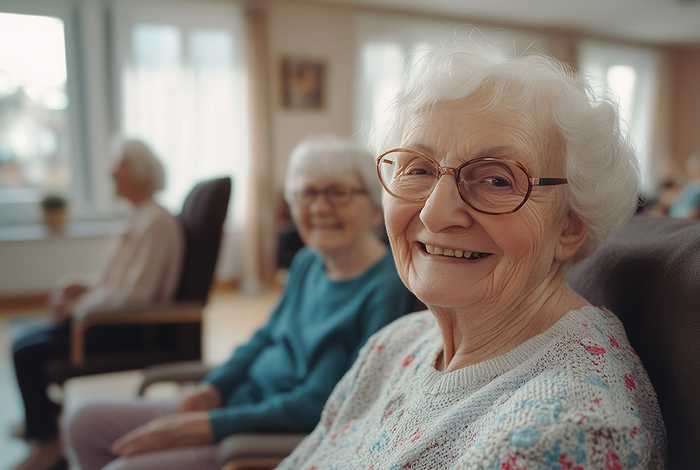Posted by Janine Griffiths
What benefits can I claim in a care home?

One of the biggest concerns that many people have when moving into a care home is the cost.
While finding the right place that feels like home is important, understanding how to cover the costs can feel overwhelming. Therefore, it is common for people to ask themselves ‘what benefits can I claim in a care home?’
Well the answer is that there are a few different benefits and financial support options that could help ease the burden of care home costs. Whether you’re paying for care yourself or receiving local authority support, knowing what you’re entitled to can make a real difference.
In this guide, we’ll walk you through the key benefits you may be able to claim while living in a care home—so you can focus on what truly matters: comfort, care, and peace of mind.
Moving into a care home?
If you are already in receipt of benefits, then it is important to let the office that pays your benefits know as soon as possible.
Even if you are only going to be in a care home one night or longer, it is still important to let your local authority know.
You will also need to provide details about any hospital stays, and details about each care home you have stayed in.
What benefits can you claim in a care home?
Not all benefits are available to those that live in a care home, while some are only partly available, and others have limitations on what can be claimed. Therefore, you may be asking yourself ‘what benefits can I claim in a care home?’
In this section, we’ll discuss some of the main options available to you. It is important to note however that eligibility for these benefits depends on your financial circumstances and in some cases, your health condition.
Below is a list of benefits that can be claimed in a care home:
Attendance Allowance
Attendance Allowance is available for those that have a long-term physical or mental condition or disability. This benefit is usually only available if you are self-funding your own care, while living in a care home. If your care is funded by the local authority, you will not usually be able to receive it.
If you have reached State Pension Age and you either have a disability or you have a condition that is severe enough that you need extra help, then it is well worth applying to see if you meet the criteria. You may also be eligible if you have needed help for at least six months. For more information on eligibility, check out this government website.
There are two rates available with Attendance Allowance, which is the lower and higher rates.
The lower rate pays £72.65 and it is for those that need frequent help or constant supervision during the day or at night.
On the other hand, the higher rate of £108.55 is for those who require assistance or supervision throughout both the day and night. It is also available for those that are needing end of life care. Check out the GOV.UK website for more information. You can also visit our blog on Attendance Allowance to learn more.
Pension Credit
Pension Credit is a means-tested benefit aimed at seniors over the State Pension Age. It is made up of two elements, which include Guarantee Credit, and the Savings portion. You can find out more about them in our ‘What is Pension Credit’ page.
If you have a disability, regardless of whether or not you live in a care home, you could get an extra £81.50 a week in Pension Credit if you are in receipt of any of the following:
- Attendance Allowance
- The middle or highest rate from the care component of Disability Living Allowance (DLA)
- The daily living component of Personal Independence Payment (PIP)
- Armed Forces Independence Payment (Afip)
- The daily living component of Adult Disability Payment (ADP) at the standard or enhanced rate
Personal Independence Payment (PIP)
Personal Independence Payment (PIP) is a UK benefit designed to help people aged 16 or over with the extra costs of living with a long-term illness, disability, or mental health condition. It has replaced Disability Living Allowance (DLA) for most adults and is available regardless of income, savings, or employment status.
PIP is divided into two components: daily living, for those who need help with everyday tasks like dressing, eating, or managing medication, and mobility, for those who struggle to get around. The amount awarded depends on an assessment of how the condition affects a person’s ability to carry out daily activities, rather than the condition itself. For more information on how to claim, check out our blog on PIP.
Disability Living Allowance (DLA) [Care and mobility]
DLA is a UK government benefit designed to help people with extra costs related to long-term illness or disability. While it is no longer available for most new adult applicants—having been replaced by Personal Independence Payment (PIP)—DLA is still provided for eligible children under 16.
The benefit is split into two components: mobility (for those who have difficulty getting around) and care (for those who need help with daily activities). The amount awarded depends on the level of support required, and it is not means-tested, meaning income and savings do not affect eligibility.
Local authority support
Your local authority can also offer additional financial support while you are in a care home. It is important to understand that this support is means-tested, meaning your finances will be assessed to determine how much you must contribute.
How means testing works
The local authority will carry out a financial assessment to review your income, savings, and assets. In England, if your total assets (including savings and property) are:
- Above £23,250 – You’ll typically need to pay for your own care (self-funding).
- Below £23,250 – The council may contribute, but you’ll need to pay part of the cost.
- Below £14,250 – The council will cover more of the costs, though your income may still be considered.
For more information about what will and will not be covered, contact your local authority.
NHS and healthcare-related benefits
The NHS also offers the following benefits to eligible individuals, regardless of where they live:
NHS Continuing Healthcare (CHC) - CHC is a package of care fully funded by the NHS for individuals with significant ongoing health needs. Eligibility is based on a detailed assessment of medical, psychological, and daily care requirements.
NHS-funded Nursing Care (FNC) - FNC provides financial support for nursing care in a care home. It is available to individuals who are not eligible for CHC but still require nursing care.
To learn more about either of these two benefits check out our advice page.
Additional support and exemptions
So now we’ve answered the question ‘what benefits can I claim in a care home?’, you may be wondering whether there are any other types of help or financial support available to seniors living in a care home. Below, we list some of the other tools available. Although these are not strictly government benefits, every little helps when it comes to giving elderly individuals the financial assistance they need.
Council tax exemption – If you move into a care home permanently and no one is living in your former home, you may be eligible for a council tax exemption. This means you won’t have to pay council tax on an empty property. If someone else remains in the home, they may qualify for a discount.
Help for veterans – If you have served in the Armed Forces, you may be entitled to additional financial support. This includes Armed Forces pensions, war widow benefits, and help from military charities such as the Royal British Legion and SSAFA. These can contribute towards care costs or provide extra financial security.
Other charitable grants & assistance – Various charities and benevolent funds offer grants to help with care home fees and other associated costs. Organisations such as Turn2us, the Care Workers’ Charity, and local community foundations may provide financial aid based on individual circumstances.
Looking for a care home?
If you have not yet found a care home to move into, Autumna can help you find a suitable one. All you need to do is visit our homepage, type in your location and you will then be able to view a list of care homes in your area.
You can also use our shortlisting tool to answer a few questions and be sent a list of even more personalised suggestions based on your circumstances and requirements.
Alternatively, you can also reach out to our friendly team of advisors on 01892 335 330.
Receive a Free Care Home Shortlist!
Let our expert team of advisers get your search off to a great start.
Tell us a little about your needs and we'll send you a bespoke shortlist of care homes! Click the button below to begin, it takes just a few minutes.
Other articles to read
From the blog

Older Persons Care Advice
Ultimate guide to care homes in Norwich
April 23rd, 2025
Discover the best care homes in Norwich—explore lifestyle-focused options, top-rated services, and how to choose the right home with confidence.

Older Persons Care Advice
How to find an adult day care centre near you
April 22nd, 2025
Looking for an adult day care centre near you? Discover how to find safe, joyful care for your loved one—and support for yourself—on Autumna.

Older Persons Care Advice
How to shortlist care homes in Exeter
April 17th, 2025
Need help shortlisting care homes in Exeter? Learn how to filter options with confidence, compare homes, and find the best fit with Autumna’s free tools.
Frequently Asked Questions
Yes you can still claim Attendance Allowance while living in a care home and pay for the costs yourself. However, you cannot get Attendance Allowance if the local authority pays for your care.
You can claim the following benefits in a care home: Attendance Allowance, Pension Credit, Disability Living Allowance, and Personal Independence Payments (PIP). However, there are strict rules about which elements of these benefits will apply. Check out our blog above for more information.
Veterans may be eligible for financial support through Armed Forces pensions, war widow(er) benefits, or grants from charities like the Royal British Legion.
The UK's largest & most detailed directory of elderly care and retirement living options
10,445
Care Homes
12,390
Home Care Services
1,671
Live-in Care Services
1,826
Retirement Living Developments
Autumna is the UK's largest and most comprehensive later-life living & elderly care directory. Our detailed search facility and team of expert advisors can help you find the best care homes, nursing homes, retirement homes, retirement villages, home care, and live-in care services for you or your loved one's needs. Our website is free to use, we are proudly independent, and we never take referral fees.






